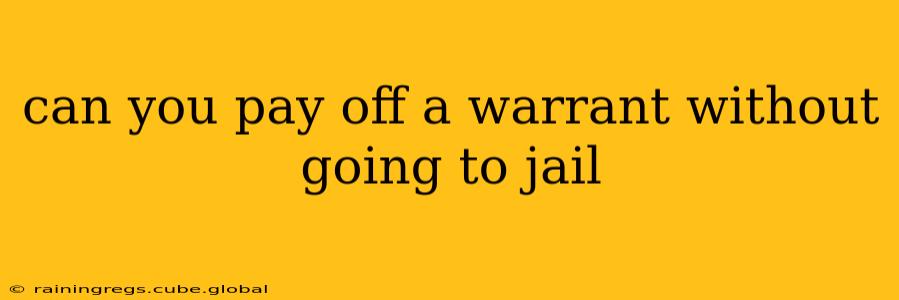Can You Pay Off a Warrant Without Going to Jail?
The short answer is: sometimes, but not always. Whether you can resolve a warrant without jail time depends heavily on several factors, including the type of warrant, the severity of the underlying offense, and the jurisdiction issuing the warrant. There's no single, universal solution. Let's explore this complex issue in detail.
What is a Warrant, and Why Would I Have One?
A warrant is essentially a court order authorizing law enforcement to arrest you. They're issued when there's probable cause to believe you've committed a crime. This could be anything from a minor traffic violation to a serious felony. Ignoring a warrant can lead to arrest, potentially resulting in jail time and additional charges.
Can I Simply Pay a Fine to Clear a Warrant?
This is a common misconception. While some minor offenses might be resolvable with a fine, paying a fine alone will almost never clear a warrant. A warrant is for your arrest, not simply for a debt. The warrant itself needs to be formally addressed through the court system. Simply paying outstanding fees doesn't automatically resolve the underlying legal issue.
How Do I Find Out About a Warrant Against Me?
You should attempt to determine if a warrant exists before attempting to resolve it. Some jurisdictions allow online warrant checks, but they often require very specific information. You might try checking the local county clerk's website or contacting the court directly. However, it's generally best to seek legal counsel before making any attempt to contact the court yourself.
What Happens If I'm Arrested on a Warrant?
Being arrested on a warrant can involve a range of consequences, from a short jail stay to prolonged incarceration, depending on the severity of the underlying charge. Additional charges might also be filed for failure to appear in court.
Can I Resolve a Warrant Without Being Arrested?
Yes, under certain circumstances. This frequently involves a process called "bond," "bail," or "surrender." This involves contacting the court or law enforcement, potentially through an attorney, and arranging a time and manner to surrender yourself. You might be able to negotiate a bond amount, after which you're released from custody pending further court proceedings. Your attorney can help determine the possibility and the best course of action in your situation.
What If I Can't Afford a Lawyer?
Many jurisdictions offer public defender services for individuals who cannot afford legal representation. Contacting the court directly or a local legal aid organization can help you determine your eligibility for these services.
What Are My Options If I Have a Warrant?
Your best option is to seek the advice of a qualified attorney immediately. They can assess your specific situation, advise you on the best course of action, and represent you during any court proceedings. Attempting to resolve a warrant without legal counsel can be risky and could lead to unforeseen negative consequences.
Disclaimer: This information is for educational purposes only and is not legal advice. The specifics of resolving a warrant vary considerably by jurisdiction and individual circumstances. Consult with a legal professional for guidance tailored to your situation.
